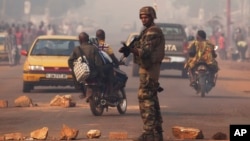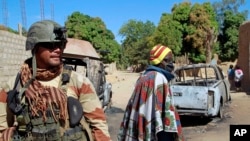PARIS —
France marks the one year anniversary this month of its military offensive in Mali by further drawing down its forces, following a relatively swift and clear cut intervention. But fresh violence this week in the Central African Republic (CAR), where another French operation enters its second month, underscores the challenges ahead.
It is not quite "mission accomplished," but French President Francois Hollande says most of France's intervention in Mali is over.
Speaking earlier this month, Hollande said only 1,600 French forces will remain in the West African country as of mid-February, compared to about 2,500 today. There will be a further drawdown to about 1,000 men. That is the number he says is needed to deal with future threats.
But France's other operation in the Central African Republic is starkly different - although Prime Minister Jean-Marc Ayrault has vowed it will be short. There, 1,600 French troops are helping to disarm fighters and restore stability. But despite the departure of Central African Republic President Michel Djotodia and plans for a new transitional government, it is proving to be a messy job.
And a very unpopular one - at least back home. A new poll by the French Institute of Public Opinion indicates six-out-of-10 French are against the intervention in CAR.
Even at the start, says IFOP's director of public opinion studies, Jerome Fourquet, only half of those surveyed supported Operation Sangaris.
Fourquet says in France, like in the United States, there's usually a sort of 'rally around the flag' effect - a sense of patriotism and support for troops at the start of an operation. But he says the French were lukewarm about intervening in CAR from the beginning.
That was not the case in Mali. French troops - and later President Hollande - were greeted by cheering crowds. Polls found a hefty majority of French supported the Serval operation there.
Fourquet said France's goals in Mali - to drive out Islamist radicals - appeared relatively clear. And French forces produced very visible and rapid results. But in CAR, he says, the peacekeeping mission is difficult to put in place. And the ongoing violence reinforces negative views here that the operation is useless and dangerous.
Fourquet says there are other issues feeding French public opinion. People feel the government should take care of French needs first.
Fourquet says France has already intervened in CAR before. Today, he says, many French are wondering what the point is. Especially given the high unemployment and public spending cuts back home.
Those criticisms are echoed by far-right National Front leader Marine Le Pen.
Le Pen says she supported the intervention in Mali, because the Malians asked France to step in. But how many times, she asks, should France be intervening in Africa? Especially since cuts in the defense budget risk putting French soldiers in danger. That is the case, she says, when it comes to CAR.
Other opposition politicians say France cannot do it alone. European and other international allies must do more to help. They may get their wish next week, when European Union foreign ministers are expected to endorse a plan for a joint military operation in Central Africa.
It is not quite "mission accomplished," but French President Francois Hollande says most of France's intervention in Mali is over.
Speaking earlier this month, Hollande said only 1,600 French forces will remain in the West African country as of mid-February, compared to about 2,500 today. There will be a further drawdown to about 1,000 men. That is the number he says is needed to deal with future threats.
But France's other operation in the Central African Republic is starkly different - although Prime Minister Jean-Marc Ayrault has vowed it will be short. There, 1,600 French troops are helping to disarm fighters and restore stability. But despite the departure of Central African Republic President Michel Djotodia and plans for a new transitional government, it is proving to be a messy job.
And a very unpopular one - at least back home. A new poll by the French Institute of Public Opinion indicates six-out-of-10 French are against the intervention in CAR.
Even at the start, says IFOP's director of public opinion studies, Jerome Fourquet, only half of those surveyed supported Operation Sangaris.
Fourquet says in France, like in the United States, there's usually a sort of 'rally around the flag' effect - a sense of patriotism and support for troops at the start of an operation. But he says the French were lukewarm about intervening in CAR from the beginning.
That was not the case in Mali. French troops - and later President Hollande - were greeted by cheering crowds. Polls found a hefty majority of French supported the Serval operation there.
Fourquet said France's goals in Mali - to drive out Islamist radicals - appeared relatively clear. And French forces produced very visible and rapid results. But in CAR, he says, the peacekeeping mission is difficult to put in place. And the ongoing violence reinforces negative views here that the operation is useless and dangerous.
Fourquet says there are other issues feeding French public opinion. People feel the government should take care of French needs first.
Fourquet says France has already intervened in CAR before. Today, he says, many French are wondering what the point is. Especially given the high unemployment and public spending cuts back home.
Those criticisms are echoed by far-right National Front leader Marine Le Pen.
Le Pen says she supported the intervention in Mali, because the Malians asked France to step in. But how many times, she asks, should France be intervening in Africa? Especially since cuts in the defense budget risk putting French soldiers in danger. That is the case, she says, when it comes to CAR.
Other opposition politicians say France cannot do it alone. European and other international allies must do more to help. They may get their wish next week, when European Union foreign ministers are expected to endorse a plan for a joint military operation in Central Africa.





